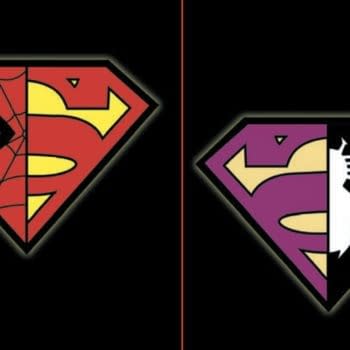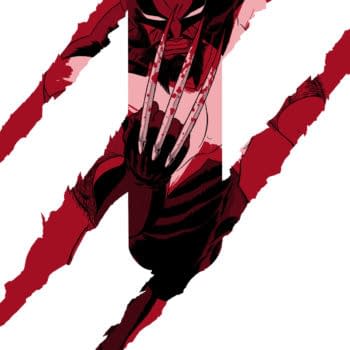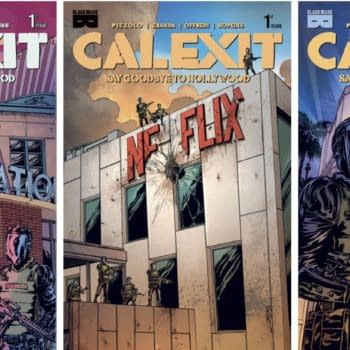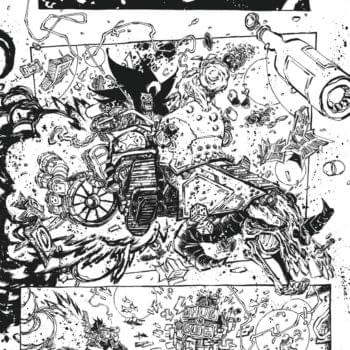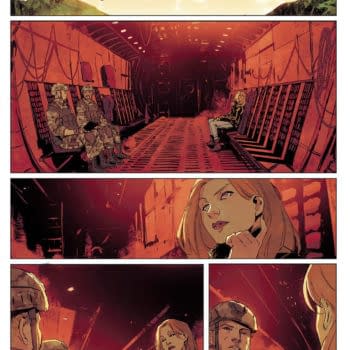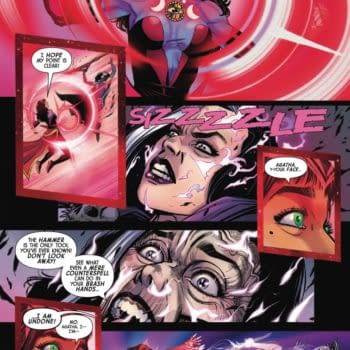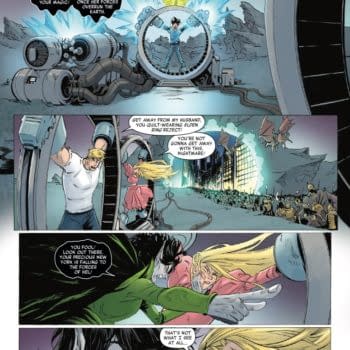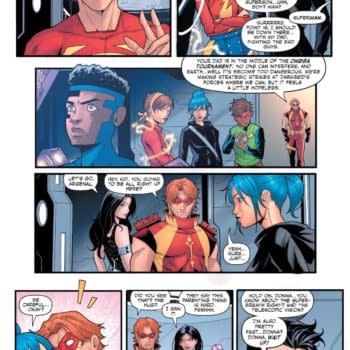Posted in: Comics | Tagged:
Talking To Luc Besson About Valerian, America, And Why He Can't Relate To Superheroes
I loved Valerian And The City Of A Thousand Planets when I saw it the other week. I've read criticism of the plot, characters and lead actors, but I think such reviewers totally miss the point and appeal of the movie. like the Fifth Element or Avatar, it's about visiting a world. It is the equivalent of a Victorian picking up a novel set in the present day. So much is presented as is, you are expected to know what a mobile phone is, what television is, what the internet is, or who Madonna might have been, but in a medium that you at least have some understanding of. And that's the experience with Valerian, you are given a hand hold in the opening montage, but mostly you are thrown into this world and expected to work it out as you go along, every ten seconds getting a new idea that would fill an episode of Black Mirror. It's an utterly amazing and absorbing experience, and that is both the point and the validity of the movie. It's a place you will revisit time and time again. And it does for the movie screen what the comics page has done for decades, filled it with information and let you dive in. And nothing more could that be more true of than the alien-filled universe of the comic books Valerian And Laureline by writer Pierre Christin and artist Jean-Claude Mézières, in the city of Galaxity, and a clear inspiration for the Cantina of Jabba The Hutt's palace of Star Wars and Return of The Jedi.

He told me how his father read Valerian And Laureline with him as a child, and was please to discover that the the sales of the original collections of Valerian and Laureline have been booming in English language territories. He told me "It's good for everyone, when you ask a doctor what you should eat he will tell you, eat a bit of everything. I really like the American comic books, I like them, but if there's only that available, there's a problem. I'm glad there's the manga on the other side and the French school of Mézières, Bilal, Moebius, which is another school. It's so worth it for everyone when you can compare, eat one on Monday, on Tuesday there's another one. When someone takes too much of the space, I fight against it, for our health. I'm so glad there is Disney, but also that there's Chihiro… I show it to my kids. My son fell in love with it. He watches it fifteen times but still loves Disney too."
As to why it has been harder for the French school of comics to find popularity in English speaking countries, he told me "It's something more European, we have a very old culture, we welcome different people from China, from everywhere, American is much younger and self-orientated, there is them and there are the others. They do great things but their tendency towards self-supremacy is a little big."
I asked if there was anything that Valerian And Laureline could teach such an audience. "What I like is Valerian is not a superhero at all. He doesn't have superpowers. Sometimes he can be heroic. If he wants to save his girl he can take two swords and fight three hundred coulkan Batoire, but the rest of the time he's a little pretentious, stupid, cracking bad jokes, a little too secure in himself, sure of himself, so he's like us and I can identify with that. It's very hard for me to identify with a superhero because he has a superpower, and I don't have a superpower, all I can see is his power and say 'oh, thank you so much for saving my life, me, poor little human being.' I don't like this relationship. I cant identify with the guy, I'm not like him."
We talked about how Valerian, in the comics, began as an authoritarian figure, a cog is the machine as opposed to Laureline, who always bucked the system, and how this changed as the stories continued, Valerian turning against his government. I asked what lessons are to be learned… and if rules are made to be broken?
"Rules are made to be followed until you can prove they are wrong, it's funny to see in the history of the human race, when one man says 'we shouldn't do that, yes I know it's the law but it's not right, let's do it differently.' The Berlin wall didn't fall because of the politicians but the people. They say, 'I'm fed up with this wall, give me a hammer.' They don't think about the consequences. It's just too much. And that's what I love about the real power of the human being, the big changes come from the simple people."
Is there too much trust in authority? "One of the big themes of the film is, for many centuries, the number one [in terms of importance in society] was the human, the number two was the business. Not even number two at the beginning, you have loyalty, the family, a bunch of things, and business and money were probably five or six. Today for the first time, we decide to put at number one, the business, and at number two, the humans. It's the biggest mistake of our entire history. This decision is wrong, and if we don't change it we will go to our end. Because you cannot do that. Human has to be first. You cannot put economy and business up front. It's impossible. We take the wrong decision every day. We know that wind power is a source of energy that's perfect, but some people say it's not profitable. But it's profitable for everyone to use that. And that's one of the biggest themes: we wipe out an entire race in the film by mistake but we don't want to pay for it."
Which brought me on to asking about the creation of the film, a blockbuster movie financed independently with crowd sourcing. And how that made a difference. "Studios would never produce this kind of film, so we have to do it. Just because it doesn't enter the system, we shouldn't not do it. Thats the beauty of art. When you take the painters, they paint what ever they want. One day Modigliani wanted to paint a woman with black eyes and a long neck. People said you can't do that, and he said 'I just did.' Picasso put the nose on the ear, one eye up one eye down, and everyone was screaming."
What changes would he have to have made to be a studio film? "The hero would have 20kg muscles more, Laureline would not be more powerful, he would have the power and be the man in charge… not so many aliens, not so many other stories around… just about how the guy can save the human race, be the hero."
Since he's had a taste of this independence, I asked if he could ever go back to the old system? Will every film be done in this way? "I'm not going to make fifteen films, maybe a couple, no idea what I'll do but I'm an artist, so I'm against nothing and no one specifically."
Given that, I asked if there were other comics that he would like to see as films, maybe from other people? "Moebius was for drawing what Miles Davis was for music, he broke the rules, he exploded the thing. When I look at Moebius, I look like a baby. My stories seem so simple and commercial compared to them. But from the American point of view, my viewpoint is super weird and strange to them. you are always the weirdo of someone. I would love to do his Airtight Garage. I did a preboarding when I was twenty years old, but it is unfeasible. Maybe someone else will do it, a young guy, crazy enough."
After seeing the film, Luc looks crazy enough for me, to do it. But this film – as with Fifth Element to which Moebius contributed designs – is a grand start. I don't think I've ever argued with critical consensus more.
Valerian And The City Of A Thousand Planets is released in the UK tomorrow. But wherever you are, see this film, and if you can, experience it in 3D. The only other film I've thought that of was Avatar and it's for very similar reason. And, yes, Valerian And Laureline, the collected editions are available in bookstores and comic stores in the US and the U.K. Why not experience both?






